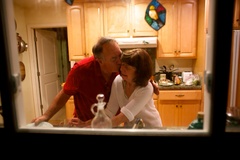
Credit: Andrew Nixon | Capital
As the U.S. population ages (there are now more Americans 65 and older than at any other time in history), the need for care giving is increasing. There are nursing homes, convalescent hospitals, and professional in-home services, but the backbone of long term care in this country is the family. One in three adults in the U.S. are caring for chronically ill or aging loved ones at home. But who cares for the caregivers? And how do they care for themselves? Without recognition and support, the backbone is at risk of breaking.
This hour-long documentary follows three caregiving families to understand the challenges they face, the stress they endure and the blessings and power of family.
James and Judy Lee
James and Judy Lee’s teenage son Justin was born with cerebral palsy. Justin requires round-the-clock care. He must be fed, have his diapers changed and be bathed like a baby. He needs physical therapy daily to stretch his limbs and stimulate his muscles. The Lees all sleep together to keep Justin safe during frequent nighttime seizures that result in disappointing developmental setbacks.
James and Judy believe their son’s severe disability has brought them closer together. And they believe God chose them to care for Justin.
The Lees hope that, with therapy, he will be able to expand his communication skills beyond what he has now—one long blink for “yes”. Justin’s 16th birthday party was held at a roller rink with other families whose children use wheelchairs.
Loretta Jackson
Loretta Jackson has been taking care of family since she was young, when her older sister Shirlene left for college and placed her in charge of her siblings. Now nearing 50, Loretta is caring for Shirlene, who after suffering a stroke is unable to walk or talk. Loretta also cares for her dad who was diagnosed with dementia two years ago.
Loretta treats her family obligations like a job. In fact, she gets paid by the State of California through the IHSS program. Loretta believes the state is getting its money’s worth. She says doctors gave up on Shirlene, but since she began caring for her, Shirlene has progressed. Her mobility is improving and she is no longer morbidly obese or suicidal.
When she’s not bathing her dad or guiding her sister through physical therapy, Loretta attends rallies and hearings at the state Capitol to advocate for caregivers.
Rick Rayburn
Rick Rayburn says his wife Marianne was a beloved schoolteacher, a devoted mother and a kind and loving woman. But younger-onset dementia has taken Marianne from him. As if that weren’t bad enough, Marianne survived thyroid cancer only to have a severe reaction to medication that left her unable to walk. As she recovers from her medical problems, the dementia is progressing. She can’t last more than a few hours at Adult Day Care. That doesn’t leave Rick enough time to take care of himself. He’s overweight, stressed out and has vertigo. He never thought his retirement would be filled with organizing Marianne’s daily activities, physical therapy and doctor’s appointments from breakfast ‘til bedtime. And he doesn’t sleep well either. He attends a monthly men’s support group for guys whose wives are living with dementia.
It’s difficult to watch someone you love turn into someone else. But Rick is using creativity and even humor to communicate with and care for his wife.
This special aired on Friday July 18, 2014 at 10 AM and 8 PM.
How do you feel about this topic?
Is there anything else you think we should know? We'd like to hear your thoughts. Send us your feedback using the form below.





